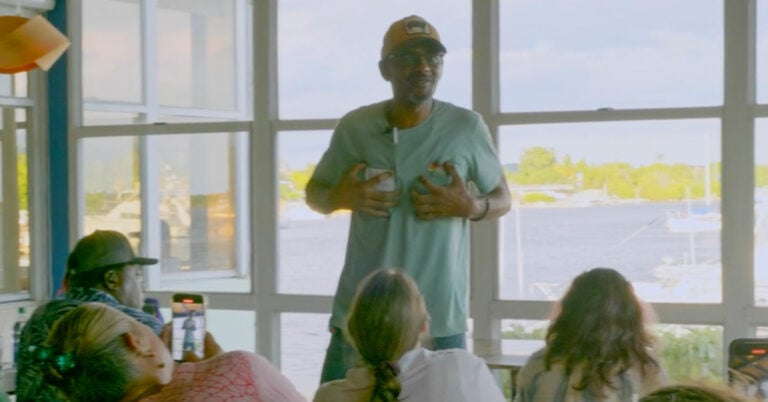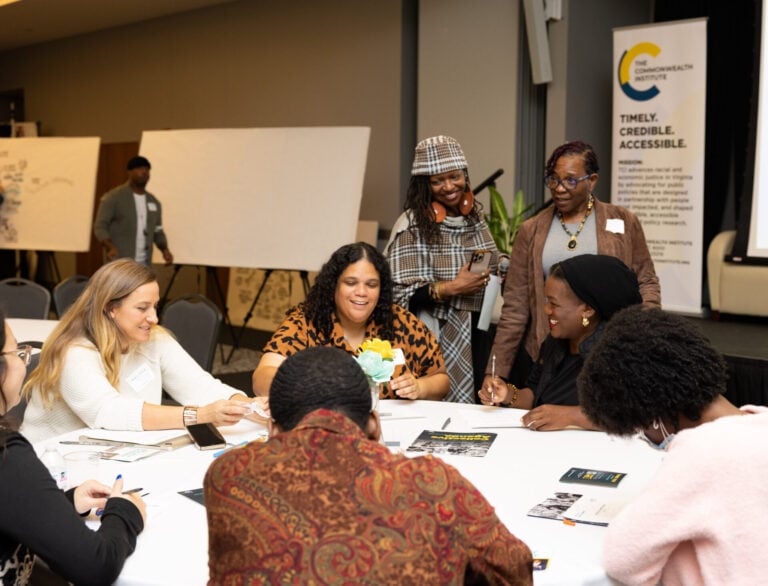Funder learning efforts can be rife with tensions.
As funders, we need to learn in order to improve how we do our work; and we don’t want to “experiment” with people’s lives or work. We want our learning to be grounded in the lived expertise of those who are most impacted but least consulted by philanthropy; and we don’t want our learning to be at the expense of community. We want to do things like compensate community members for their time and expertise, and we don’t want to be overly transactional in our relationships.
These tensions were all evident during and since Fund for Shared Insight’s Participatory Climate Initiative, a one-time grantmaking project we created to explore participatory practices in philanthropy.
During what ended up being an almost four-year effort, from 2020 through 2023, we learned a lot about engaging individuals with lived expertise to design and then implement a grantmaking process. We published a Participatory Philanthropy Toolkit to share our learnings with the philanthropic sector and encourage funders to adopt participatory practices. And we maintained a stance of transparency and curiosity throughout, supporting our learning and evaluation partner, ORS Impact, to produce reports and observations on the work, and asking our funder partners from Hewlett, Kellogg, and MacArthur to share their reflections.
But we also recognized the tensions inherent in running a one-time learning initiative and how issues raised, especially around power dynamics, did — and should continue to — challenge our thinking. Earlier this year, the Shared Insight team members most closely involved in this initiative took time out for a facilitated conversation about some of the more complex issues that came up as a result of the initiative. This conversation surfaced two key questions:
• What are the ethical considerations around prioritizing funder learning in a specific initiative and in Shared Insight’s work overall?
• How do we as funders use our power to benefit others and shift how power operates?
Reflections on funder learning
From the outset, one of the primary goals of the Participatory Climate Initiative was to learn about whether and how participatory grantmaking can help elevate community voices and share power. We were relatively issue-area agnostic; the choice to focus on climate change was a result of serendipitous encounters and personal passions among individual funder collaborative members.
This set-up put us in an unusual position for a funder. We were more interested in the process of grantmaking than in what the grants and/or grantees would achieve. And with a limited budget and time commitment, we were aware the initiative on its own would be less than a drop in the bucket that is the work around climate change. But with Shared Insight’s goal of improving philanthropy in mind, we pressed ahead with designing our own participatory grantmaking learning project, which we and the participatory design team believed would push the envelope more than other efforts we saw at the time.
Looking back, we’ve identified other inherent tensions with a one-time, time-bound initiative. For example, we had facilitated the creation of two participatory grantmaking groups and built relationships and deep connections with and between the individuals involved, including hosting two in-person convenings of the participants and the funded groups (at their request) to further mutual learning and connection. We’re proud of these beautiful containers we created for the participatory work, but we know — and the participants made it clear to us — that we left behind so much opportunity for more. And we continue to ask ourselves whether there might have been other ways — such as joining existing projects, which we did initially explore doing — that would have supported our learning goals without us creating our own one-time effort.
At the same time, feedback from participants showed that, overall, they had a good experience with the initiative, pointing in an evaluation to three specific benefits: gaining deeper perspective, increased knowledge, and stronger connections. No one expressed regret in participating, and, in fact, some participants have continued to nurture the personal and professional relationships developed during the process.
We believe that funder learning and insights communicated back to the field are essential for changing philanthropy. We also recognize there are ethical considerations to these processes. We tried to navigate this tension by listening and being transparent throughout the Participatory Climate Initiative, and we also continue to reflect on the ethical issues in the context of our past and ongoing work. Funders need opportunities to learn, and those opportunities need to be designed in ways that don’t cause harm to the people and communities affected by their decisions.
We believe that funder learning and insights communicated back to the field are essential for changing philanthropy. We also recognize there are ethical considerations to these processes.
Reflections on power
In participatory philanthropy, the funder often decides, with intention or by default, the extent to which the process can actually promote authentic power shifting and sharing with community.
In our participatory initiative, aside from the big-picture parameters, such as it being a one-time effort, Shared Insight funders laid out relatively few requirements for the participatory design team. Those included that grants be made domestically and focus on climate change.
After a 10-week process, the design team came back to us with recommendations on where grants would be made, what grantees could do with the funds, how decisions about grants would be made, and who would make decisions about the grants. The team also recommended a more expansive definition of “climate change” and “advocacy” than the ones we had given, which would affect the kinds of groups and work that would be eligible for grants. Shared Insight approved all of these recommendations.
An additional design-team recommendation, one we also followed, strongly suggested that the $1 million allocated for the initiative was insufficient. In response, we raised another $1 million to bring the total to $2 million. This ability to quickly double the grantmaking dollar pool is an example of the power we as funders, particularly a funder collaborative, can use to benefit the community.
However, our team recognized that we did not choose to use our power to raise $10 million or $100 million (which would have been much more difficult to do), nor did we decide to increase the timeframe of the grants to be multi-year, as some participants recommended during the consultation phase of this work. At the end of the initiative, we also did not choose to use our power and time to try to connect each of the grantee groups with other funding sources; nor did we elect to continue the work as many of the grantmaking groups and grantees hoped we would (despite us stating clearly upfront that this was a one-time initiative).
The choices we made about how to shift and share power, and how to use our own power, are not so different from the choices all funders make as they consider how to incorporate listening into their work, how to respond to what they hear, and how to shift power to community. Funders have time constraints, whether actual or self-imposed, and finite resources. We work in organizations with goals and competing priorities that are not always ours to control. We began the initiative believing that we were ceding most of the power, and we learned that participants did not necessarily share our conception of power or feel that power had been shifted, and we were asked to use our power in ways we hadn’t contemplated. This was an important lesson we will apply to the rest of our work, and an insight that philanthropy needs to spend more time wrestling with.
Continuing to reflect
I am very proud of and inspired by what Shared Insight was able to create and support through the Participatory Climate Initiative. This video captures the joy and meaning the participants and the grantees they selected experienced. Thirty-five groups, many of whom had previously never received money from institutional philanthropy, were given one-time, unrestricted funds ($50,000 to $75,000 each) for a total of $2 million to address climate issues in Indigenous communities in Alaska and Hawai’i and communities in the Southeastern U.S., including Puerto Rico and the U.S. Virgin Islands. Participants were compensated and every group considered was guaranteed a minimum of $10,000.
I am also proud that Shared Insight honed its mission in large part because of what we learned from the initiative. We are now fully focused on improving philanthropy by helping funders and nonprofits listen to shift power to communities most harmed by structural racism and systemic intersectional inequities.
And I am so pleased we can offer the Participatory Philanthropy Toolkit based on the initiative. We know that participatory philanthropy, done right, is an effective strategy for shifting power to community, and we want to see funders do more and go further in this. Already, some of our funder partners are adapting their grantmaking, including one making a big new investment in a longer-term participatory effort.
Our experience with the initiative has changed us, we believe for the better, even as we continue to wrestle with the tensions and questions it brought to the fore. I welcome you to join us in dialogue around these issues and others. Please reach out directly to me or my colleagues, visit us at LinkedIn, or subscribe to our newsletter — let’s be in conversation.
About the author:








